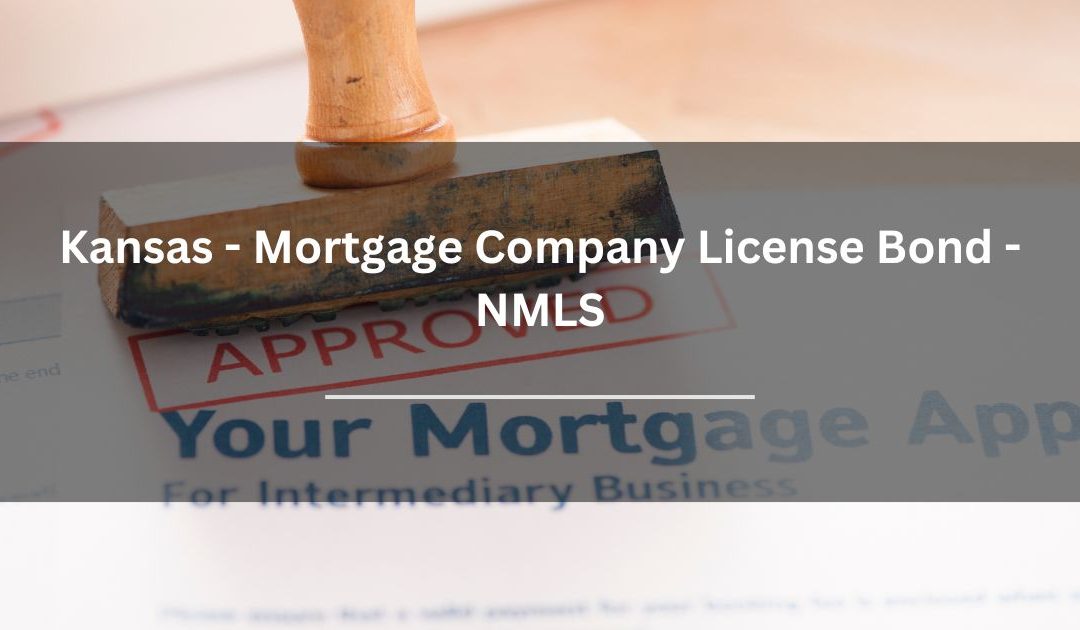Get an Instant Quote on Mortgage Company License ($100,000) Bond – NMLS
Get an Instant Quote on Mortgage Company License ($125,000) Bond – NMLS
Introduction
Securing a mortgage company license in Kansas is a significant step toward operating legally and responsibly in the lending industry. One of the primary requirements is obtaining the Kansas – Mortgage Company License ($100,000) Bond – NMLS, which ensures compliance with state laws and protects consumers from fraudulent or unethical lending practices. This bond plays a key role in safeguarding the financial interests of borrowers while ensuring mortgage companies fulfill their obligations under state regulations. Like the Kansas – Motor Vehicle Dealer $50,000 Bond and the Kansas – International Fuel Tax Agreement (IFTA) Bond, this is bond is vital.

Misconceptions About Mortgage Company License Bonds
We’ve noticed that some mortgage companies misunderstand the purpose of a license bond. Many believe that it serves as a type of insurance policy for their business, but this is not the case. Instead, the bond functions as a financial guarantee to the state and consumers, ensuring that the mortgage company adheres to industry regulations and ethical business practices.
Additionally, some companies assume that obtaining a license bond is a one-time requirement. In reality, the bond must be renewed regularly to maintain compliance, and failure to do so could result in penalties or license suspension.
Steps to Obtain the Kansas – Mortgage Company License Bond
Based on our experience, the process for obtaining this bond involves several steps:
- Verify Bond Requirements – The Kansas Office of the State Bank Commissioner (OSBC) requires mortgage companies to maintain a $100,000 bond for licensing under the Nationwide Multistate Licensing System & Registry (NMLS).
- Apply with a Surety Provider – Companies must submit an application, providing details about their financial history and business operations.
- Undergo a Financial Review – The surety provider evaluates creditworthiness to determine the bond premium.
- Secure and File the Bond – Once issued, the bond must be submitted electronically through the NMLS system before the license is granted.
- Maintain Active Status – Companies must ensure the bond remains active and up to date to comply with Kansas mortgage regulations.

Compliance Requirements for Mortgage Companies in Kansas
What we’ve discovered is that mortgage companies must follow strict guidelines to maintain their license and bond status:
- Adherence to State Lending Laws – Companies must comply with K.S.A. 9-2201 through K.S.A. 9-2220, which govern mortgage lending practices in Kansas.
- Timely Reporting and Recordkeeping – Lenders must submit reports to the Kansas OSBC, detailing loan transactions and financial standing.
- Consumer Protection Obligations – Mortgage companies must handle loans ethically, providing transparent terms and conditions to borrowers.
- Annual Bond Renewal – The bond must be renewed to avoid penalties or license suspension.
Consequences of Non-Compliance
In our observation, failing to meet bond and licensing requirements can result in serious consequences, including:
- License Revocation – The Kansas OSBC may suspend or revoke the mortgage license for non-compliance.
- Legal Penalties – Companies may face fines and legal action for failing to uphold state lending regulations.
- Bond Claims – If a company engages in fraudulent or deceptive practices, a claim may be filed against the bond, requiring repayment to the surety.

Advantages of the Kansas – Mortgage Company License Bond
We’ve learned that obtaining this bond provides several benefits to mortgage companies and consumers:
- Legal Compliance – Ensures the company meets state licensing requirements.
- Consumer Confidence – Provides financial protection to borrowers in case of misconduct.
- Business Credibility – Demonstrates a commitment to ethical lending practices.
Kansas-Specific Bonding Laws for Mortgage Companies
Kansas enforces strict bonding regulations to oversee mortgage lending activities:
- K.S.A. 9-2203 – Requires all mortgage lenders and brokers operating in Kansas to be licensed through the NMLS system and maintain a surety bond.
- K.A.R. 17-24-1 – Establishes bond filing and renewal requirements, ensuring continuous compliance.
- Kansas OSBC Bonding Policy – Outlines conditions under which the state may require additional bonding based on a company’s risk profile.
These laws ensure that mortgage lenders in Kansas remain financially accountable and uphold ethical business practices.

Conclusion
We’ve come to appreciate that the Kansas – Mortgage Company License ($100,000) Bond – NMLS is a vital component of the mortgage lending industry. It protects consumers, ensures compliance, and promotes ethical lending practices.
Mortgage companies that secure this bond demonstrate their commitment to responsible lending and regulatory compliance. By working with a trusted surety provider like Swiftbonds, businesses can navigate the bonding process efficiently and maintain good standing with the Kansas OSBC.
Frequently Asked Questions
Who needs the Kansas – Mortgage Company License Bond?
We’ve often noticed that all mortgage lenders and brokers in Kansas must obtain this bond before receiving their license.
How much does the bond cost?
We’ve found that the cost depends on factors such as credit score, financial history, and business risk profile. Companies with strong credit typically pay lower premiums.
What happens if a claim is filed against the bond?
We’ve observed that if a mortgage company violates state laws or engages in unethical practices, a claim may be filed. The surety may compensate the claimant, but the business must reimburse the surety.
How often does the bond need to be renewed?
We’ve often noticed that the bond must be renewed annually through the NMLS to maintain compliance with Kansas regulations.
Where is the bond filed?
We’ve found that the bond must be submitted electronically through the NMLS system, which manages mortgage licensing requirements in Kansas.


